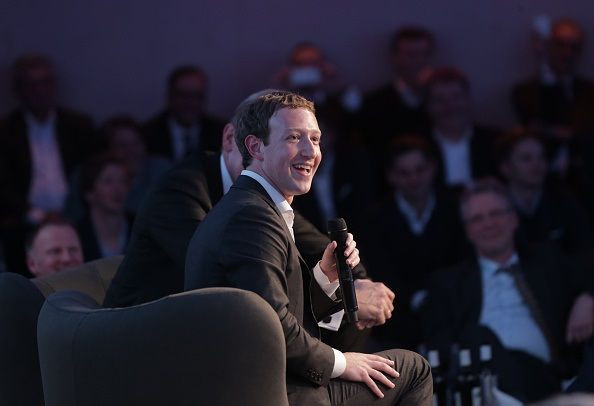Facebook’s Zuckerberg Takes Charm Offensive To Berlin

Prominent Germans appeared starstruck by Facebook's Mark Zuckerberg on a visit to Berlin on Thursday even while talking tough about the social network's record on data protection and hate speech.
Zuckerberg is on a charm offensive in Germany, where the company he co-founded has faced criticism for months from politicians and regulators over its privacy practices and a slow response to anti-immigrant postings by neo-Nazi sympathizers.
The 31-year-old entrepreneur met Chancellor Angela Merkel's chief of staff, told journalists about his vision for the future of Facebook and received an award from publisher Axel Springer while avoiding controversial topics.
Merkel adviser Peter Altmeier told journalists after the meeting that Zuckerberg had understood the importance of removing illegal content from the Internet.
Afterwards, he posted on Twitter about "a really good conversation with a man who changed the world", publishing a picture of the two together.
Max Schrems - the Austrian law student who has fought multiple lawsuits against Facebook including one that sank the Safe Harbour agreement on transatlantic data transfers - contrasted the approach of European governments with the way the U.S. Federal Bureau of Investigation has demanded Apple unlock an iPhone at the center of a criminal investigation.
"The only thing that's mind-blowing to me is how European governments 'negotiate' and 'ask' these companies to comply with the applicable law. In Germany it's hate speech and privacy, in the UK it's taxes - but they don't treat them like a subject to its law, but another nation state," he told Reuters.
Zuckerberg disarmed his audience while collecting a Springer award for entrepreneurial spirit awarded for the first time this year, talking of his predilection for gray T-shirts and expertise in changing diapers.
"I got it down to 20 seconds," he told an audience that included his wife Priscilla Chan, senior executives of Facebook partner Samsung Electronics, and publishing heiress Friede Springer.
Springer CEO Mathias Doepfner took what he called a contrarian view on hate speech, saying he did not believe it was the role of social networks to police what was said in their communities, a job he believed belonged to publishers.
Facebook's rules forbid bullying, harassment and threatening language, but critics say it does not enforce them properly. It has hired a Bertelsmann business services unit to monitor and delete racist posts on its platform in Germany.
Doepfner, whose company has taken Google to court for refusing to pay newspaper publishers for displaying their content online, praised Facebook's Instant Articles feature, which displays publishers' news articles within the Facebook mobile app, with their permission and sharing the benefits.
He said he did not want to discuss the issue of data privacy and data security. "That's too complicated; I don't want to get into that tonight," he said.
It was left to Martin Schulz, president of the European parliament, to address the more thorny issues, offering Zuckerberg a debate that he said would benefit both sides.
"We in Europe have something to learn from you, namely your engaging sense of optimism and your inspiring vision of the future. You can show us how to reach for the stars,' he said.
"In return, we will share with you our long experience of cultural diversity and show you that a sensitive approach to the use of data and the protection of copyright are fundamental components of our society."
Zuckerberg may have to address such questions on Friday, when he will answer questions from the public at a town hall meeting. He does not plan to take questions from the press and has not done so throughout his visit to Berlin so far.
© Copyright Thomson Reuters 2024. All rights reserved.




















